While the electronic logging device mandate dominated the trucking industry news cycle in 2017, there were still a number of other notable stories throughout the year.
President Donald Trump’s regulatory freeze in January, the permanent removal of 2013’s 34-hour restart regulations, the withdrawal of a potential sleep apnea rulemaking and more were some of the most-read stories of the year on Overdrive.
Below, we’ll take a look at the top stories on Overdrive from each month of 2017.
January
 Some of President Donald Trump’s first actions in office had major implications for the trucking industry and some pending regulations.
Some of President Donald Trump’s first actions in office had major implications for the trucking industry and some pending regulations.President Donald Trump didn’t waste any time after being sworn into office on Jan. 20 before calling for a freeze on new regulations. At the time, it was unclear how the freeze would affect trucking, but it effectively delayed the implementation of a driver training rule until later in the year. Its seemingly had little affect otherwise, though the DOT under Trump has stalled regulations in the works under President Obama’s DOT, as well as withdrawn others.
Another of Trump’s first actions as president called for federal agencies to eliminate two regulations for every new one. Trump said the move was to ease the regulatory burden on small businesses. This order, at least in part, helped spell the end of the sleep apnea rulemaking and delay a potential speed limiter mandate.

The ELD mandate earned a court victory in January when a three-judge panel for the U.S. 7th Circuit Court of Appeals denied a request from the Owner-Operator Independent Drivers Association to rehear its case against the mandate. The court ruled in October 2016 to uphold the mandate.
February
 Trump’s regulatory freeze was essentially a “death knell” for the speed limiter mandate.
Trump’s regulatory freeze was essentially a “death knell” for the speed limiter mandate.President Trump’s regulatory freeze was still making trucking headlines in February when Joe Rajkovacz, head of regulatory affairs for the Western States Trucking Associations, said the freeze would be “a death knell for the speed limiter mandate.”
The Federal Motor Carrier Safety Administration issued new guidance regarding the ELD mandate that allowed owner-operators with older ELDs that aren’t compliant with the mandate two more years to comply.
Owner-operators were allowed to join a lawsuit brought against C.R. England by two independent contractors after a judge gave permission for the lawsuit to proceed as a class action lawsuit. The plaintiffs alleged fraud and other statutory claims against the carrier.
March
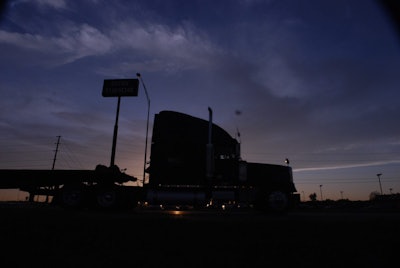 FMCSA announced in March it would end the regulations governing 34-hour restarts.
FMCSA announced in March it would end the regulations governing 34-hour restarts.March started out with a bang when FMCSA announced it would end the 34-hour restart regulations requiring two consecutive early morning periods. Following the release of the results of a study into FMCSA’s 2013 34-hour restart regulations, FMCSA confirmed the regulations would not go back into effect. The study revealed the regulations provided no safety benefit to the industry.
FMCSA outlined its progress toward a flexible split sleeper berth pilot program at a Managing Fatigue conference. FMCSA’s Kelly Regal said the program would enter its data collection phase during 2017.
More regulatory news came out later in March with the announcement by the DOT that the Safety Fitness Determination rule would be withdrawn. Due to industry concern over the Compliance, Safety, Accountability carrier rating system, FMCSA decided to withdraw the SFD rule and start over.
April
 Overdrive‘s guide to the ELD mandate, including device specs, costs, features and more.
Overdrive‘s guide to the ELD mandate, including device specs, costs, features and more.The ELD Buyers’ Guide was put together by Overdrive staff covering all aspects of the devices, including features, how the devices work, different ELDs available and their specs, the costs of different devices and more.
A tragic story out of Illinois caught the attention of readers in April, as a truck driver was shot and killed while driving on I-88. Eduardo Munoz, 43, of Sunrise, Fla., was driving a Volvo when another driver fired a gun into his truck. He was shot, but pulled his truck over to the side of the road.
In continuing their fight against the ELD mandate, OOIDA and other trucking groups sent a letter directly to Transportation Secretary Elaine Chao asking her to nix the rule. The Trucking Alliance promptly sent a rebuttal to Chao asking her to keep the mandate.
May
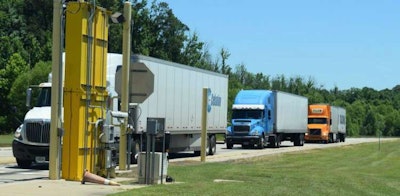 Owner-operators began making plans in May for CVSA’s annual 72-hour International Roadcheck inspection blitz.
Owner-operators began making plans in May for CVSA’s annual 72-hour International Roadcheck inspection blitz.Another month, another update on the fight against the ELD mandate. This time, the DOT declined to file opposition to OOIDA’s request for the Supreme Court to hear its lawsuit against the mandate. The court eventually, as noted below, declined to hear OOIDA’s case.
Each June, the Commercial Vehicle Safety Alliance holds its 72-hour International Roadcheck inspection blitz, and owner-operators began to prepare for 2017’s iteration in May. Cargo securement was CVSA’s main point of emphasis for inspectors this year.
Trucker and singer-songwriter Tony Justice launched the “ELD or Me” campaign in May with the tagline “Time to unite.” Justice and owner-operator Scott Reed began discussing plans for a Washington, D.C., demonstration for later in the year.
June
 UPS petitioned FMCSA in June for an exemption from certain provisions of the ELD mandate.
UPS petitioned FMCSA in June for an exemption from certain provisions of the ELD mandate.OOIDA’s challenges to the ELD mandate were effectively killed in June when the U.S. Supreme Court declined to hear a lawsuit challenging the rule. The Supreme Court’s decision left in place a ruling from a lower court upholding the mandate.
One of the nation’s largest fleets, UPS, waited until about six months before the ELD mandate’s compliance date to file for an exemption from certain provisions of the rule. The company’s request was the beginning of several that were filed over the course of the next several months.
July
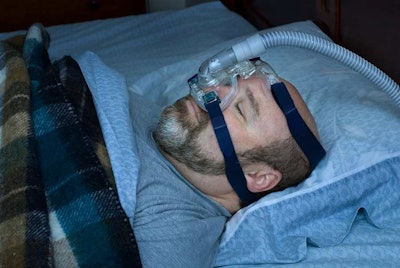 FMCSA announced it would be withdrawing the proposed sleep apnea rulemaking.
FMCSA announced it would be withdrawing the proposed sleep apnea rulemaking.FMCSA announced in July the sleep apnea rulemaking that had been in the works would be nixed, and a potential speed limiter mandate was delayed indefinitely. Both of these rulemakings had been under fire from owner-operators.
Owner-operators earned the support of at least one member of Congress in July when Texas Rep. Brian Babin filed the ELD Extension Act of 2017, which, if enacted, would delay the compliance date until December 2019. Despite garnering dozens of sponsors, the bill saw no action in the House.
A panel of lawmakers in the U.S. House had also been listening to owner-operators and called on the U.S. DOT to study whether a “full or targeted delay” of the ELD mandate for small carriers was warranted. Those efforts ultimately failed to produce any effect, with the December 18 deadline coming with no delay for smaller carriers.
August
 Truckers were warned before the rare solar eclipse in August about driving during the event.
Truckers were warned before the rare solar eclipse in August about driving during the event.The first total solar eclipse visible to the continental United States in nearly 40 years occurred in August, and truckers were put on alert with warnings and tips for driving during the rare event. At least portions of 14 states saw a total eclipse of the sun, where the moon blocked the sun out for nearly three minutes.
Following up on FMCSA’s July announcement that the sleep apnea rulemaking in progress would be nixed, the rule was officially withdrawn in August. FMCSA had worked on the apnea rule in 2016, publishing a pre-rule and conducting listening sessions across the country, but did not gather enough data to warrant a rulemaking.
Overdrive Senior Editor Todd Dills explored in his Channel 19 blog in August the cost to owner-operators of FMCSA’s indecision about the pre-2000 ELD exemption. Up until August, it was unclear if the exemption applied to the model year of the chassis or engine. FMCSA clarified that the exemption applied to the engine’s model year, rather than the truck’s itself.
September
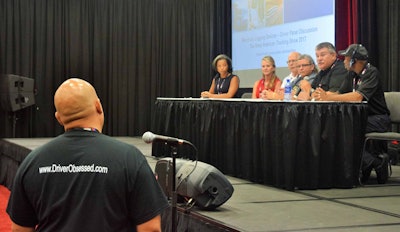 A panel of drivers and owner-operators spoke at GATS about who the days of “catching up the logbook” would be gone after the ELD mandate takes effect.
A panel of drivers and owner-operators spoke at GATS about who the days of “catching up the logbook” would be gone after the ELD mandate takes effect.Two separate ELD protest groups – ELD or Me and Operation Black and Blue – were busy in September making plans for their early-October visits to Washington, D.C. The unaffiliated groups picked Oct. 3 to descend on the nation’s capital and shut down for a few days to fight back against ELDs.
The anti-ELD crowd suffered another blow in September when the House of Representatives rejected an amendment to the 2018 appropriations package that would have stalled the mandate for at least 10 months.
A panel of owner-operators and drivers at August’s Great American Trucking Show explored how “catching up the logbook” would be a thing of the past under the ELD mandate. The panel also touched on how customers will have to be “trained” for new expectations of when loads will arrive.
October
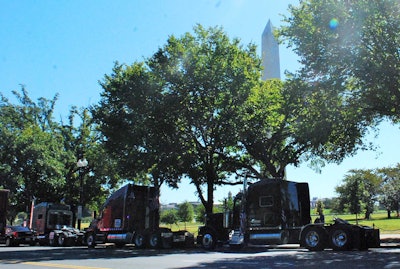 Truckers gathered in Washington, D.C., in October to protest the ELD mandate.
Truckers gathered in Washington, D.C., in October to protest the ELD mandate.The ELD protests were in full swing the first week of October, and Overdrive’s Todd Dills was on the scene first-hand to gather stories and photos from the D.C. events. He checked in with the efforts of both the Operation Black and Blue group and ELD or Me.
Following up on UPS’ request for an exemption from portions of the ELD mandate, FMCSA granted two waivers to all carriers, not just UPS. First, FMCSA said it would allow drivers using phone-based ELDs to change their duty status while outside of and away from their truck. The other waiver allows for multiple yard moves without having to re-enter “yard move” status on the device.
The glider kit building industry in October scored a major win when the Environmental Protection Agency formally proposed to repeal the Obama-era emissions regulations placed on glider kits. The emissions regulations would have forced glider kit manufacturers to dramatically change their operations to meet the standards, potentially killing the industry all together. However, the move by the EPA shields them from having to comply with the Obama-era regs.
November
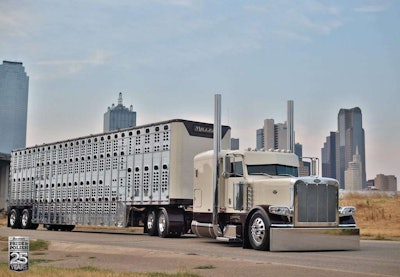 FMCSA granted livestock haulers until mid-March to comply with the ELD mandate.
FMCSA granted livestock haulers until mid-March to comply with the ELD mandate.Agriculture and livestock haulers, who in many cases operate under an hours-of-service exemption, were given a 90-day reprieve in November from ELD compliance. FMCSA announced a waiver that gave these haulers until mid-March to comply with the mandate.
With the ELD compliance date just around the corner, OOIDA filed a request with FMCSA for at least a five-year exemption from the mandate for small trucking ompanies that “do not have a Carrier Safety Rating of ‘Unsatisfactory’” and have no at-fault crashes. The agency has not yet ruled on the request.
Texas Rep. Brian Babin also wasn’t finished fighting for an ELD delay, as he wrote a letter directly to President Trump asking for an executive order to delay the mandate at least until April 1, 2018.
December
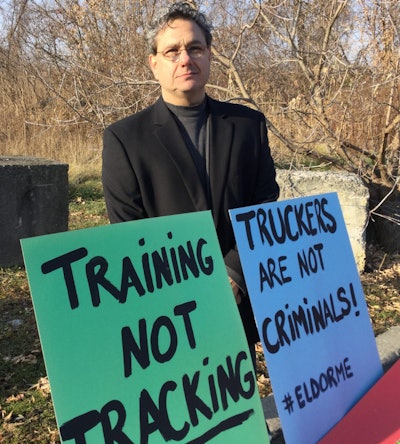 Truckers turned out on Dec. 4 for an “ELD Media Blitz.” Shown is Buffalo, N.Y.-based owner/operator Pat Valenti with some of the signs at the Syracuse event.
Truckers turned out on Dec. 4 for an “ELD Media Blitz.” Shown is Buffalo, N.Y.-based owner/operator Pat Valenti with some of the signs at the Syracuse event.Two years after FMCSA finalized and published its ELD rule, the mandate’s compliance date arrived. See Overdrive‘s coverage here and here of the mandate’s first days.
On Dec. 4, truckers around the country gathered for a so-called “ELD Media Blitz” to inform local media and the public on the potential problems owner-operators would face under the mandate. On-site reporting from Overdrive editors from Nashville, Tenn.; Hollywood, Ala.; and Syracuse, N.Y.
FMCSA issued an effective shutdown order for a Kentucky-licensed trucker who had a drug overdose while driving in Ohio and crashed his truck. Local TV reports stated he had overdosed on heroin. The driver had a history of drug issues, according to FMCSA.









